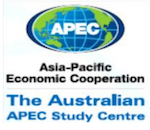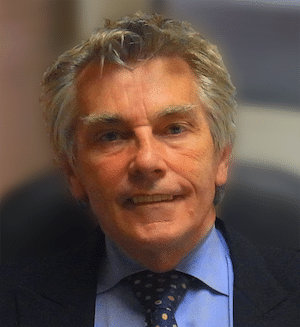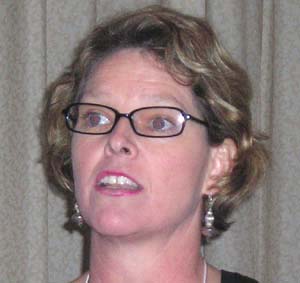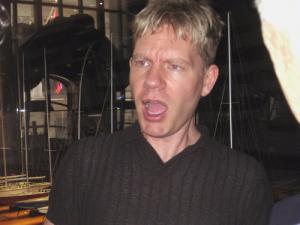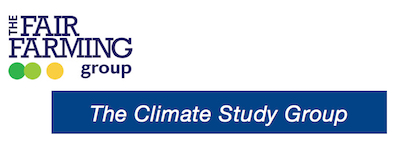Australian APEC Study Centre
Background
The Australian APEC (Asia-Pacific Economic Cooperation) Study Centre at RMIT University describes its mission as to “advocate and advance APEC’s objectives of promoting open trade and investment, structural reform, the strengthening of financial systems and regional integration.”1“The Australian APEC Study Centre at RMIT University” (PDF), APEC.org.au, March 9, 2010.
According to its website, the Australian APEC Study Centre at RMIT is “a leading centre in the Asia-Pacific region in terms of advocacy of APEC’s objectives of promoting open trade and investment, structural reform and regional integration through training programs, supporting institutional capacity building, symposia, dialogues and publications. It does this together with its component facility, the Melbourne APEC Finance Centre.”2“About the Centre,” The Australian APEC Study Centre. Archived August 18, 2017. Archive.is URL: https://archive.is/0wZnA
The Asia-Pacific Economic Cooperative (APEC) was created in 1989 and now boasts it encompasses 21 members spanning four continents. The center was established at the APEC Leaders Summit in 1993, where leaders agreed to set up APEC Study Centres “in the higher education sector to promote APEC’s goals and objectives.”3“About the Centre,” The Australian APEC Study Centre. Archived August 18, 2017. Archive.is URL: https://archive.is/0wZnA
From 1997 to 2009, the Centre was administered by Monash University. In 2007, the State Government of Victoria funded the Melbourne APEC Finance Centre which functioned as a part of the Australian APEC Study Centre. In April of 2009, both Centres were transferred to RMIT University’s College of business.4“About the Centre,” The Australian APEC Study Centre. Archived August 18, 2017. Archive.is URL: https://archive.is/0wZnA
The Centre has functioned as a pro-free trade think tank, and also has a history of opposing the Kyoto Protocol and other climate change legislation.5“About the Centre,” The Australian APEC Study Centre. Archived August 18, 2017. Archive.is URL: https://archive.is/0wZnA
Climate science denier and lobbyist Alan Oxley functions as Chair of the Australian APEC Study Centre, while he also managed the Asia Pacific Page of the now-defunct www.techcentralstation.com, a website that regularly promoted the views of climate change deniers.6“The prospects for global collaboration on climate change” (PDF), APEC.org, January 2005.
Stance on Climate Change
March 2010
“The science of how the world’s climate works is very weak. The models used by the UN to predict changes have enormous gaps of knowledge. There is also very vigorous debate among scientists about whether or not levels of carbon dioxide cause global warming or are caused by it. In other words, we do not know if human generated carbon dioxide is significant or not. Many of us just want to think it is.”7“The prospects for global collaboration on climate change” (PDF), APEC.org, January 2005.
Funding
According to their brochure, “The Centre successfully bids for funds to support these activities from the Commonwealth government from AusAID and other sources. The Victorian Government finances activities of the Melbourne APEC Finance Centre to promote work in financial regulatory training and Melbourne as a regional financial centre.”8“The Australian APEC Study Centre at RMIT University” (PDF), APEC.org.au, March 9, 2010.
Key People
Personnel/Staff
Note, 2005 through 2011 were individuals listed on the Australian APEC Study Centre’s “Activity Report,” while 2017 are those listed on the Centre’s website as of 2017 (although it is not clear when that list was last updated.)
| Name | 2005 – 2006 | 2006 – 2007 | 2007 – 2008 | 2008 – 2009 | 2010 – 2011 | 2017 | Description |
| Alan Oxley | Y | Y | Y | Y | Y | Chairman | |
| Briony Wood-Ingram | Y | Y | |||||
| Aaron Soans | Y | Research Fellow | |||||
| Alberto Posso | Y | Principal Research Fellow | |||||
| Bonnie Rivendell | Y | Senior Manager (Acting) | |||||
| Douglas Brooks | Y | Principal Research Fellow | |||||
| Errol Muir | Y | Publications Editor | |||||
| Joaquin (Jack) Gelvezon | Y | Reporting and Minitoring Analyst | |||||
| John Farrugia | Y | Project Officer | |||||
| Kevin Nguyen | Y | Project and Communications Assistant | |||||
| Lisa Barker | Y | Lead Staffer of the ABAC Australia Secretariat | |||||
| Roslyn Zakaria | Y | Project Officer | |||||
| Margot Kilgour | Y | Y | Executive Manager | ||||
| Alex Kerangpuna | Y | Temporary Intern | |||||
| Elissa Macleod | Y | ||||||
| Jack Gelvezon | Y | ||||||
| Mary Prusakova | Y | Temporary Intern | |||||
| Alex Katz | Y | Y | Y | Project Manager | |||
| John McKay | Y | Y | Y | Senior Associate | |||
| Lauren Streifer | Y | Y | Y | Project Manager | |||
| Kenneth Waller | Y | Y | Director, Australian APEC Study Centre (and Melbourne APEC Finance Centre) | ||||
| Jaime Jobson | Y | Y | Y | Communications and Executive Manager | |||
| Judi O’Gorman | Y | Y | Y | Financial and Administrative Officer | |||
| Alison Hendy | Y | Y | |||||
| Ken Waller | Y | Y | Chair | ||||
| Tim Wilson | Y | Project Manager (Resigned. April 2006) |
Advisory Board
| Name | 2010 – 2011 | 2017 | Description |
| Alan Oxley | Y | Y | Chairman |
| Mark Johnson AO | Y | Y | Chairman of the Board, Australian ABAC Member |
| Andrew Macintyre | Y | Deputy Vice-Chancellor International and Vice-President RMIT | |
| Chris Tinning | Y | Assistant Secretary APEC Branch, Investment and Economic Diplomacy Division, Department of Foreign Affairs and Trade (Observer) | |
| Geoff Raby | Y | Geoff Raby & Associates | |
| Ian Palmer | Y | Pro Vice-Chancellor and Vice-President, College of Business, RMIT University | |
| John Denton AO | Y | Partner and CEO of Corrs Chambers Westgarth | |
| Justin Hanney | Y | Lead Deputy Secretary Department of Economic Development, Jobs, Transport and Resources, Victorian Government | |
| Ken Waller | Y | Chair | |
| Merilyn Liddell AM | Y | Former President of RMIT Vietnam | |
| Amb Richard Woolcott AC | Y | Former Secretary, Department of Foreign Affairs and Trade | |
| Bruce Kean AM | Y | Past Chairman of the Board | |
| David Hanna | Y | Deputy Secretary, International Coordination Department of Innovation, Industry and Regional Development, State Government of Victoria | |
| John Larkin | Y | Assistant Secretary, APEC Branch, Department of Foreign Affairs and Trade | |
| Kenneth Waller | Y | Director, Australian APEC Study Centre (and Melbourne APEC Finance Centre) | |
| Ian Palmer | Y | Pro Vice-Chancellor and Vice-President, College of Business, RMIT University | |
| Paul James | Y |
Financial Services Advisory Board
| Name | 2005 – 2006 | 2006 – 2007 | 2007 – 2008 | 2008 – 2009 | 2010 – 2011 | Description |
| Alan Oxley | Y | Y | Y | Y | Y | Chairman |
| Chris Gaskell | Y | Y | Y | Y | Y | Head of International Relations, Australian Prudential Regulation Authority |
| Christine Brown | Y | Y | Y | Y | Y | Professor, Department of Accounting and Finance, Monash University |
| David Knox | Y | Y | Y | Y | Y | Worldwide Partner, Mercer Consulting |
| Jules Gribble | Y | Y | Y | Y | Y | Director, Enterprise Metrics |
| Kevin Davis | Y | Y | Y | Y | Y | Research Director, Melbourne Centre for Financial Studies |
| Ian Thompson | Y | Y | Y | Y | Managing Director, Chief Credit Officer and Head of Research & Training (Asia-Pacific), Standard & Poor’s | |
| Kathryn Watt | Y | Y | Y | Y | Principal General Council and Company Secretary, Vanguard Investments Australia Ltd | |
| Joe Garbutt | Y | Y | Y | Policy Director, Institute of Internal Auditors – Australia | ||
| Aaron Smith | Y | Y | Associate Pro-Vice Chancellor (Industry Engagement), College of Business, RMIT University | |||
| Kenneth Waller | Y | Y | Director | |||
| On Kit Tam | Y | Y | Y | Deputy Pro-Vice Chancellor (Business International), College of Business, RMIT University | ||
| Justin Douglas | Y | Manager, Bank Policy Unit, Australian Treasury | ||||
| Richard Foster | Y | Director, Foster Infrastructure | ||||
| Rod Maddock | Y | Head of Group Strategy, Commonwealth Bank | ||||
| Ros Grady | Y | Associate Professor, University of New South Wales | ||||
| Adeline Hiew | Y | Senior Associate, Blake Dawson | ||||
| Hugh Moor | Y | (Observer). Director, Financial Services, Department of Innovation, Industry and Regional Development, State Government of Victoria | ||||
| Robert Glading | Y | Y | Y | Y | Consultant and Former Insurance Commissioner | |
| Tim Coyne | Y | Y | Y | Y | Partner, Financial Services, Ernst and Young | |
| Edmond U | Y | Y | Y | CommInsure, Commonwealth Bank of Australia | ||
| Richard Fisher | Y | Y | Y | General Counsel, Office of General Counsel, University of Sydney | ||
| Sean Balding | Y | Y | Y | Ernst and Young | ||
| Syd Bone | Y | Y | Y | Chairman, Melbourne Centre for Financial Studies | ||
| Leonie Lethbridge | Y | Y | Head of Risk – International Partnerships, ANZ | |||
| Marcus Chadwick | Y | Y | Australian Prudential Regulation Authority | |||
| Tony D’Arcy | Y | Y | Project Manager- Financial Services, Department of Innovation, Industry and Regional Development | |||
| Kerstin Wijeyewardene | Y | Financial System Division, Australian Treasury | ||||
| Ken Waller | Y | Y | Y | Chair | ||
| Chris Legg | Y | Y | General Manager, Financial SysteDivision, Department of the Treasury | |||
| Nick Minogue | Y | Y | Division Head, Risk Management, Macquarie Bank Limited | |||
| Development | Y | |||||
| Jaime Jobson | Y | Communications and Executive Manager | ||||
| Jayne Godfrey | Y | Deputy Dean, Research, Faculty of Business and Economics, Monash | ||||
| Kim Holmes | Y | Manager, International Cooperation Office of International Relations, Australian Securities and Investments Commission | ||||
| Paul Rekaris | Y | Project Manager -Financial Services, Department of Innovation and Regional | ||||
| Kim Holmes | Y | Senior Lawyer, Office of International Relations, Australian Securities and Investments Commission; | ||||
| Mark Blair | Y | National Manager, International Affairs, Australian Stock Exchange; | ||||
| Natalie Wells | Y | Director, Financial Services Ratings Asia Pacific, Standard and Poor’s. | ||||
| Nelun Jayasinghe | Y | (Alternate member) Australian Prudential Regulation Authority | ||||
| Siwe Sin Yuan | Y | (Observer) Associate, Insurance Regulation Development Division, Insurance Department,Monetary Authority of Singapore; and | ||||
| Stefan Hohl | Y | (Observer) Representative Officer for Asia and the Pacific, Bank for International Settlements. |
Actions
March 2008
Bill Bown of ITS Global wrote in an Australian APEC Study Centre publication that the Stern Report and the Garnaut Review on climate change “are advocating an approach to climate change that would increase, not decrease, poverty.”9Bill Bowen. “The Stern Strategy on climate change would increase poverty – Garnaut should not go down the same path,” APEC Currents, March 2008. Archived August 21, 2017. Archive.is URL: https://archive.is/RrsBv
“Economic growth is the best way to continue to reduce poverty. However the Stern Report recommends we decrease growth,” the Centre’s publication claims. “The Stern strategy would reverse the current trends to eliminate poverty. It would increase the number of people in poor countries in absolute poverty.”10Bill Bowen. “The Stern Strategy on climate change would increase poverty – Garnaut should not go down the same path,” APEC Currents, March 2008. Archived August 21, 2017. Archive.is URL: https://archive.is/RrsBv
April 2005
The Centre organized a conference entitled “Managing Climate Change: Practicalities and Realities in a post-Kyoto future” supported by Tech Central Station and the International Public Affairs website.11“Papers available from the Australian APEC Study Centre Conference, April 4 ‘Managing Climate Change: Practicalities and Realities in a post-Kyoto future’,” Climate Change Issues. Archived May 5, 2005. Archive.is URL: https://archive.is/H6llK The conference, which included several climate science deniers as speakers, was also sponsored by Xstrata and ExxonMobil.12APEC Currents (June, 2005 issue). Archived August 21, 2017. Archive.is URL: https://archive.is/4tcVo
Speakers included:13“Centre Activity Report: June 2004 – June 2005” (PDF), The Australian APEC Study Centre.
- Harlan Watson
- Qingqing Zhao
- Alan Oxley — Chairman of the Australian APEC Study Centre, Monash University.
- Graeme Pearman — Director, GP Consultants Pty Ltd.
- Bob Carter
- William Kininmonth
- John Zillman
- Garth Paltridge
- Roger Beale — Senior Associate, The Allen Consulting Group.
- Brian Fisher — Director, Australian Bureau of Agricultural and Resource Economics.
- Meg McDonald — General Manager Corporate Affairs, Alcoa World Alumina Australia.
- Aynsley Kellow
- Alan Moran — Director, Deregulation Unit, Institute of Public Affairs.
- Jon Stanford — The Allen Consulting Group.
January 2005
After attending the tenth meeting of parties to the UN Framework Convention on Climate Change, The Australian APEC Study Centre’s Chair, Alan Oxley, wrote a paper titled “The prospects for global collaboration on climate change.“14“The prospects for global collaboration on climate change” (PDF), APEC.org, January 2005.
Oxley writes that the Kyoto Protocol emissions reductions “would have negligible impact on global emission of carbon dioxide.” He proposes a “practical strategy for Australia,” where he recommends that emissions trading would be an “outdated” strategy, adding: “There is no point in Australia’s allying with the EU alone to support a global warming strategy that cannot work and which reduces global competitiveness.”15“The prospects for global collaboration on climate change” (PDF), APEC.org, January 2005.
He goes on to promote a supposed “debate” on the science of global warming.16“The prospects for global collaboration on climate change” (PDF), APEC.org, January 2005.
“This debate has real substance. A principal indicator of this is the unwillingness of Green groups to engage,” he writes. “The general response from Green groups has been to say the science was settled years ago and that there is a comprehensive consensus among scientists that global warming is occurring and that human activity is the leading contributor. There has been orthodoxy rather than a consensus about the science.”17“The prospects for global collaboration on climate change” (PDF), APEC.org, January 2005.
Without citing sources, Oxley writes that “more detailed temperature readings of the upper atmosphere […] “generally do not support the claim that temperatures are rising in the atmosphere.”18“The prospects for global collaboration on climate change” (PDF), APEC.org, January 2005.
August 21, 1997
The APEC Study Centre organized a conference titled “Countdown to Kyoto” in conjunction with the Frontiers of Freedom Institute.19“Countdown to Kyoto: The Consequences of Mandatory CO2 Emission Reductions,” Monash University. Archived August 6, 1997.
Speakers included Patrick Michaels, John Christy, and Alan Oxley as well as Jerry Ellis, past Chairman of the multinational BHP Ltd. and Peter Hartley, director of a think tank called the Tasmania Institute.
At the conference, U.S. Senator Chuck Hagel commented, “I believe we are headed down the wrong path in the negotiations for any global climate treaty to be signed in Kyoto, Japan, this December.”
Hagel went on to cite well-known climate change denier Richard S. Lindzen, quoting him as saying “a decade of focus on global warming and billions of dollars of research funds have still failed to establish that global warming is a significant problem.”
Hagel concludes that the “path to Kyoto should be abandoned until we have a better idea of the climate changes we are dealing with and until we can come up with a truly global solution that is fair and equitable for all the nations involved.”20“Countdown to Kyoto” an International Conference on The Consequences of Mandatory Global CO2 Emission Reductions: Remarks by United States Senator Chuck Hagel” (PDF), Retrieved from APEC.org.au.
The centre also released a 1997 report before the conference, similarly titled “Countdown to Kyoto” written by prominent climate change denier John R. Christy. The paper describes climate change as an “uncertain phenomenon” and claims that warming is “more modest” than models suggest, which could “ take away some of the urgency for
immediate action on CO2 reductions.” The paper also promotes the supposed benefits of CO2, and downplays dangers of increased concentrations in the atmosphere, saying:21John R. Christy. “‘Countdown to Kyoto’: The Consequences of the Mandatory Global Carbon Dioxide Emissions Reductions, Australian APEC Study Centre, Canberra, 19–21 August 1997” (PDF), The Australian APEC Study Centre, 1997.
“There is nothing toxic about CO2 at levels even five times that of the current amount. Plant life flourishes with increased CO2 (up to three times present concentrations), and the entire biosphere is invigorated with CO2 in greater concentrations. It was in such a rich CO2 atmosphere (at least three times today’s levels) that most of our present biosphere evolved,” the paper claims.
Contact & Location
Room 26, Level 6, Building 8022“Contact Us,” The Australian APEC Study Centre. Archived August 21, 2017. Archive.is URL: https://archive.is/sJnMB
445 Swanston Street, Melbourne VIC 3000
Australia
Fax: +61 3 9925 5624
Related Organizations
- The Lavoisier Group – Alan Oxley was a speaker at the inaugural conference of the climate science denial group.
- Tech Central Station (TCS) — Alan Oxley ran the Asia Pacific page of TCS while also working as Chair of the Australian APEC Study Centre.23“The prospects for global collaboration on climate change” (PDF), APEC.org, January 2005.
Other Resources
- “The development costs of the Stern Review findings – implications for building consensus on global strategies for climate change” (PDF), The Australian APEC Study Centre, August 2007.
Resources
- 1“The Australian APEC Study Centre at RMIT University” (PDF), APEC.org.au, March 9, 2010.
- 2“About the Centre,” The Australian APEC Study Centre. Archived August 18, 2017. Archive.is URL: https://archive.is/0wZnA
- 3“About the Centre,” The Australian APEC Study Centre. Archived August 18, 2017. Archive.is URL: https://archive.is/0wZnA
- 4“About the Centre,” The Australian APEC Study Centre. Archived August 18, 2017. Archive.is URL: https://archive.is/0wZnA
- 5“About the Centre,” The Australian APEC Study Centre. Archived August 18, 2017. Archive.is URL: https://archive.is/0wZnA
- 6“The prospects for global collaboration on climate change” (PDF), APEC.org, January 2005.
- 7“The prospects for global collaboration on climate change” (PDF), APEC.org, January 2005.
- 8“The Australian APEC Study Centre at RMIT University” (PDF), APEC.org.au, March 9, 2010.
- 9Bill Bowen. “The Stern Strategy on climate change would increase poverty – Garnaut should not go down the same path,” APEC Currents, March 2008. Archived August 21, 2017. Archive.is URL: https://archive.is/RrsBv
- 10Bill Bowen. “The Stern Strategy on climate change would increase poverty – Garnaut should not go down the same path,” APEC Currents, March 2008. Archived August 21, 2017. Archive.is URL: https://archive.is/RrsBv
- 11“Papers available from the Australian APEC Study Centre Conference, April 4 ‘Managing Climate Change: Practicalities and Realities in a post-Kyoto future’,” Climate Change Issues. Archived May 5, 2005. Archive.is URL: https://archive.is/H6llK
- 12APEC Currents (June, 2005 issue). Archived August 21, 2017. Archive.is URL: https://archive.is/4tcVo
- 13“Centre Activity Report: June 2004 – June 2005” (PDF), The Australian APEC Study Centre.
- 14“The prospects for global collaboration on climate change” (PDF), APEC.org, January 2005.
- 15“The prospects for global collaboration on climate change” (PDF), APEC.org, January 2005.
- 16“The prospects for global collaboration on climate change” (PDF), APEC.org, January 2005.
- 17“The prospects for global collaboration on climate change” (PDF), APEC.org, January 2005.
- 18“The prospects for global collaboration on climate change” (PDF), APEC.org, January 2005.
- 19“Countdown to Kyoto: The Consequences of Mandatory CO2 Emission Reductions,” Monash University. Archived August 6, 1997.
- 20
- 21John R. Christy. “‘Countdown to Kyoto’: The Consequences of the Mandatory Global Carbon Dioxide Emissions Reductions, Australian APEC Study Centre, Canberra, 19–21 August 1997” (PDF), The Australian APEC Study Centre, 1997.
- 22“Contact Us,” The Australian APEC Study Centre. Archived August 21, 2017. Archive.is URL: https://archive.is/sJnMB
- 23“The prospects for global collaboration on climate change” (PDF), APEC.org, January 2005.

